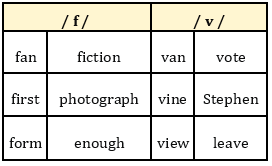Unit 13 lớp 10: Films and Cinema-Language Focus
Trong phần Language Focus của Unit 13 "Films and Cinema" lớp 10 này, các em sẽ luyện phát âm / f / và / v /; đồng thời biết cách thành lập và áp dụng Attitudinal Adjective (Tính từ chỉ thái độ), làm quen với cấu trúc "It was not until that ...." (Mãi cho đến khi) và phân biệt các mạo từ a, an và the.
Mục lục nội dung

1. Pronunciation Unit 13 lớp 10
Listen and repeat (Nghe và nhắc lại)
- Practise these sentences (Luyện tập các câu sau)
1. He feels happy enough.
2. I want a photograph for myself and my wife.
3. Would you prefer a full photograph or a profile?
4. Stephen is driving a van full of vines.
5. We used to live in a village in the valley.
6. They arrived in the village on a van.
Tạm dịch
1. Anh ta thấy vui.
2. Tôi muốn chụp hình với vợ.
3. Bạn thích bức ảnh chân dung hay chỉ một góc trên khuôn mặt hơn?
4. Stephen đang lái một chiếc xe tải chở đầy nho.
5. Chúng tôi từng sống trong một ngôi làng ở thung lũng.
6. Họ đến làng trên một chiếc xe tải.
2. Grammar Unit 13 lớp 10
2.1. Exercise 1 Unit 13 lớp 10
Write the adjectival forms of the verbs below (Viết dạng tính từ của những động từ dưới đây)
1. fascinate ______ 6. bore______
2. excite _______ 7. surprise ______
3. terrify_______ 8. amuse ______
4. irritate _______ 9. embarrass ______
5. horrify _______ 10. frustrate ______
Guide to answer
1. Fascinate ⟹ fascinating/ fascinated (mê hoặc)
2. Excite ⟹ excting/ excited (phấn khích)
3. Terrify ⟹ terrifying/ terrified (khinh khủng)
4. Irritate ⟹ irritating/ irritated (khó chịu)
5. Horrify ⟹ horrfying/ horrified (kinh hoàng, rùng mình)
6. Bore ⟹ boring/ bored (buồn chán)
7. Suprise ⟹ suprising/ suprised (ngạc nhiên)
8. Amuse ⟹ amusing/ amused (vui)
9. Embarrass ⟹ embarrassing/ embarrassed (lúng túng)
10. Frustrate ⟹ frustrating/ frustrated (thất vọng)
2.2. Exercise 2 Unit 13 lớp 10
Complete two sentences for each situation. Use an adjective ending -ing or-ed form of the verb in brackets to complete each sentence (Điền hai câu cho mỗi tình huống. Dùng tính từ tận cùng với -ing hoặc -ed của động từ trong ngoặc để điền mỗi câu)
1. It's been raining all day. I hate this weather. (depress)
a) The weather is ________ .
b) This weather makes me________ .
2. Astronomy is one of Tan's main interests. (interest)
a) Tan is_______ in astronomy.
b) He finds astronomy very_______ .
3. I turned off the television in the middle of the program. (bore)
a) The program was ________.
b) I was________ with the program.
4. Lan is going to Singapore next month. She has never been there before. (excite)
a) Lan is really________ about going to Singapore.
b) It will be an _______ experience for her.
5. Huong teaches small children. It’s a hard job. (exhaust)
a) Huong often finds her job_______ .
b) At the end of the day's work she is often________ .
Guide to answer
1.
a) The weather is depressing. (Thời tiết thật là chán.)
b) This weather makes me depressed. (Thời tiết này làm tôi chán nản.)
2.
a) Tan is interested in astronomy. (Tân hứng thú với thiên văn học.)
b) He finds astronomy very interesting. (Anh ấy nhận thấy thiên văn học rất thú vị.)
3.
a) The program was boring. (Chương trình rất nhàm chán.)
b) I was bored with the progam. (Tôi thấy chán với chương trình này.)
4.
a) Lan is really excited about going to Singapore. (Lan thực sự rất hào hứng về việc đi đến Singapo.)
b) It will be an exciting experience for her. (Đó là là một trải nghiệm đáng nhớ cho cô ấy.)
5.
a) Huong often finds her job exhausting. (Hương thường thấy công việc của cô ấy rất mệt mỏi.)
b) At the end of the day’s work she is often exhausted. (Cuối ngày làm việc, cô ấy thường cảm thấy kiệt sức.)
2.3. Exercise 3 Unit 13 lớp 10
Rewrite the following sentences (Viết lại những câu sau)
1. She didn't become a teacher until 1990.
It was not until _________
2. He didn't know how to swim until he was 30.
It was not until __________
3. They didn’t begin to learn English until 1980.
It was not until_____________
4. The boy didn't do his homework until his father came home.
It was not until____________
5. The football match didn't start until the lights were on.
It was not until_____________
Guide to answer
1. It was not until 1990 that she became a teacher. (Mãi đến năm 1990 cô mới trở thành một giáo viên.)
2. It was not until he was 30 that he knew how to swim. (Mãi đến năm 30 tuổi anh ta mới biết bơi.)
3. It was not until 1980 that they began to learn English. (Mãi đến năm 1980 họ mới bắt đầu học Tiếng Anh.)
4. It was not until his father came home that the boy did his homework. (Mãi đến khi cha về nhà cậu bé mới làm bài tập ở nhà của mình.)
5. It was not until the lights were on that the football match started. (Mãi đến khi đèn sáng lên trận đấu bóng đá mới bắt đầu.)
2.4. Exercise 4 Unit 13 lớp 10
Put a (n) or the in the numbered blanks (Điền a(n) hoặc the vào những chỗ trống có đánh số)
1. This morning I bought (0) a newspaper and (1)______ magazine. (2)______ newspaper is in my bag, but I don't know where I put (3) ______ magazine.
2. I saw (4)_______ accident this morning. (5)_______ car crashed into (6)______ tree. (7)______ driver of (8)______ car wasn't hurt, but (9)_______ car was badly damaged.
3. There are two cars parked outside: (10)_______ blue one and (11) _______ grey one. (12)_______ blue one belongs to my neighbours; I don't know who (13)_______ owner of the grey car is.
4. My friends live in (14)_______ old house in (15)_______ small village. There is (16)_______ beautiful garden behind (17)_______ house. I would like to have (18)_______ garden like that.
Guide to answer
1. This morning I bought a newspaper and (1) a magazine. (2) The newspaper is in my bag, but I don’t know where I put (3) the magazine. (Sáng nay tôi mua một tờ báo và một cuốn tạp chí. Tờ báo còn ở trong túi, nhưng không biết tôi để cuốn tạp chí ở đâu.)
2. I saw (4) an accident this morning. (5) A car crashed into (6) a tree. (7) The driver of (8) the car wasn’t hurt, but (9) the car was badly damaged. (Tôi thấy một vụ tai nạn vào sáng nay. Một chiếc ô tô đâm vào một cái cây. Tuy tài xế của chiếc xe đó không bị thương nhưng chiếc xe bị hỏng nghiêm trọng.)
3. There are two cars parked outside: (10) the blue one and (11) the grey one. (12) The blue one belongs to my neighbors; I don’t know who (13) the owner of the grey car is. (Có hai chiếc xe ô tô đang đậu ở bên ngoài: một cái màu xanh dương và một cái màu xám. Chiếc xe màu xanh dương của hàng xóm tôi; còn chiếc màu xám là của ai.)
4. My friends live in (14) an old house in (15) a small village. There is (16) a beautiful garden behind (17) the house. I would like to have (18) a garden like that. (Bạn tôi sống trong một ngôi nhà cũ ở một ngôi làng nhỏ. Có một khu vườn rất đẹp phía sau ngôi nhà. Tôi muốn có một khu vườn như thế.)
3. Practice Task 1
Select the best option to complete the sentences (Chọn đáp án đúng để hoàn thành câu)
1. Americans drive _______ third of _______ 400 million cars on _______ planet.
A. one-the-the
B. a-X-the
C. one-X-a
D. a-the-a
2. _______ you miss this train you can _______ catch the next one.
A. Because-often
B. If-always
C. When-usually
D. Unless-sometimes
3. I thought I _______ him come in _______ we were having dinner.
A. hear-when
B. look-while
C. looked-when
D. heard-while
4. _______ I know likes the smell of bacon - _______ Mike does and he's a vegetarian.
A. Anyone-but
B. No one-while
C. Everyone-even
D. Someone-and
5. _______ opportunity as good as this arises _______ in a lifetime.
A. A-before
B. One-twice
C. The-during
D. An-once
6. _______, I'd like to thank everyone _______ coming this evening.
A. Always-to
B. Finally-for
C. Often-by
D. Lastly-with
7. The dinosaurs died _______ 65 million years _______.
A. out-ago
B. away-before
C. down-after
D. off-next
8. As I have _______ mentioned, I doubt _______ we will able to raise all the money we need.
A. just-when
B. finally-what
C. recently-if
D. already-that
4. Practice Task 2
Put a/ an, the or Ø in each space to complete the following sentences (Điền a/ an, the hay Ø vào chỗ trống để hoàn thành các câu sau)
1. I’m sorry. I didn’t mean to do that. It was _____ mistake.
2. There were no chairs, so we had to sit on _____ floor.
3. Lucy has just gotten _____ job in _____ bank in Chicago.
4. There’s _____ bookstore on _____ corner near my house.
5. It’s very cold in here. Can you close _____ window, please?
6. If you go past _____ post office, can you get me some stamps?
7. It was _____ very hot day. It was _____ hottest day of _____ year.
8. What’s _____ name of _____ woman who sat beside you at the dinner?
9. How often do you go to _____ movies?
10. “Can you tell me where _____ Room 306 is, please?” “It’s on _____ third floor.”
Để ôn tập kiến thức về từ vựng và ngữ pháp có trong Unit 9, mời các em luyện tập bài trắc nghiệm Unit 13 Language Focus Tiếng Anh 10 sau đây.
6. Conclusion
Qua bài học này các em cần lưu ý một số điểm ngữ pháp sau
a. Attitudinal Adjective (Tính từ chỉ thái độ)
- Các tính từ chỉ thái độ được thành lập từ quá khứ phân từ (past participle) diễn tả con người cảm thấy như thế nào (how people feel). Các tính từ được thành lập từ hiện tại phân từ (present participle) nêu lên cảm giác người hoặc vật tạo ra. Nói một cách dễ hiểu hơn, chủ ngữ chỉ người thường đi kèm với tính từ có đuôi "-ed", chủ ngữ chỉ vật thường đi với tính từ có đuôi "-ing".
Ví dụ
- I was very interested in the lesson. (Tôi có hứng thú với tiết học này.)
- The lesson is interesting. (Tiết học này rất thú vị.)
b. It was not until that .... (Mãi cho đến khi)
- Mệnh đề khẳng định + until: chỉ ai đó làm việc gì cho đến lúc nào đó thì thôi.
Ví dụ
I lived in New York until I got married. (Tôi sống ở New York cho đến lúc tôi kết hôn.)
- Mệnh đề phủ định + until: chỉ mãi cho đến lúc cái gì đó xảy ra thì cái kia mới xảy ra.
- It was not until + year + that: (Mãi cho đến năm nào đó cái gì đó mới xảy ra.)
- It was not until 1985 that I graduated from university. (Mãi cho đến năm 1985 tôi mới tốt nghiệp đại học.)
c. Mạo từ a / an và the
- Mạo từ không xác định a/an dùng trước danh từ số ít đếm được (a: dùng trước danh từ bắt đầu bằng phụ âm và an: đứng trước danh từ bắt đầu bằng nguyên âm)
- Những trường hợp không dùng mạo từ bất định: Không dùng trước danh từ số nhiều (chairs, flowers, children...); không dùng trước danh từ không đếm được (milk, hair, water...); không dùng trước danh từ trừu tượng (beauty, happiness...)

